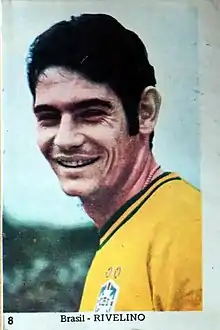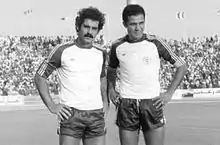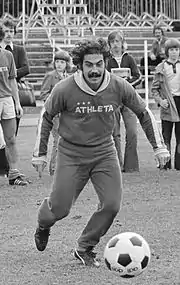Rivellino
Roberto Rivellino (also Rivelino, Brazilian Portuguese: [ʁoˈbɛʁtu ʁiveˈlĩnu]; Italian: [roˈbɛrto rivelˈlino]; born 1 January 1946) is a Brazilian football pundit and retired footballer. He was one of the stars of Brazil's 1970 FIFA World Cup winning team. Rivellino currently works as a pundit for Brazilian TV Cultura.[6]
 Rivalino depicted in a football card issued in Argentina, 1970 | |||||||||||||||||||
| Personal information | |||||||||||||||||||
|---|---|---|---|---|---|---|---|---|---|---|---|---|---|---|---|---|---|---|---|
| Full name | Roberto Rivellino | ||||||||||||||||||
| Date of birth | 1 January 1946 | ||||||||||||||||||
| Place of birth | São Paulo, SP, Brazil | ||||||||||||||||||
| Height | 1.69 m (5 ft 7 in)[1] | ||||||||||||||||||
| Position(s) | Attacking midfielder | ||||||||||||||||||
| Youth career | |||||||||||||||||||
| 1962 | C.A. Barcelona | ||||||||||||||||||
| 1963–1964 | Corinthians | ||||||||||||||||||
| Senior career* | |||||||||||||||||||
| Years | Team | Apps | (Gls) | ||||||||||||||||
| 1965–1974 | Corinthians[2][3][4] | 236 | (70) | ||||||||||||||||
| 1975–1978 | Fluminense[4] | 45 | (10) | ||||||||||||||||
| 1978–1981 | Al-Hilal | 57 | (25) | ||||||||||||||||
| Total | 338 | (105) | |||||||||||||||||
| National team | |||||||||||||||||||
| 1965–1978[5] | Brazil | 92 | (26) | ||||||||||||||||
| Teams managed | |||||||||||||||||||
| 1994 | Shimizu S-Pulse | ||||||||||||||||||
Honours
| |||||||||||||||||||
| *Club domestic league appearances and goals | |||||||||||||||||||
The son of Italian immigrants from Macchiagodena (Isernia), he was famous for his large moustache, bending free kicks, long range shooting, accurate long passing, vision, close ball control and dribbling skills.[7] He also perfected a football move called the "flip flap", famously copied by Romário, Mágico González, Ronaldo, Ronaldinho and Cristiano Ronaldo in recent years.[8] A former attacking midfielder, he is widely regarded as one of the most graceful football players ever, and one of the greatest players of all time. With the close control, feints and ability with his left foot, Diego Maradona named Rivellino among his greatest inspirations growing up.[9] In 2004, he was named by Pelé in the FIFA 100 list of the world's greatest living players.[10]
Club career
Rivellino was born in São Paulo, and started as a futebol de salao player at Clube Atletico Barcelona. After that, he tried his luck with Barcelona's biggest rival, Corinthians, where he moved on to professional football and quickly became a favourite of the fans—and was therefore nicknamed "O Rei do Parque" (King of the Park) (after the club's home ground, Parque São Jorge). However, the late 60s and early 70s were one of the most troubled periods in the history of the club, which did not win a single São Paulo state league title between 1954 and 1977.

In 1974, after Corinthians was defeated by arch-rivals Palmeiras in the São Paulo league finals, as the star player Rivellino was singled out by most fans as one of the most responsible for not winning. He moved on to Rio de Janeiro, where he defended Fluminense until the end of the 1970s. Rivellino was undoubtedly the greatest star in the excellent Fluminense of the mid 70s, dubbed "the tricolor machine", among Doval, Pintinho, Gil and Carlos Alberto Torres. He won the Rio de Janeiro league championship in 1975 and 1976. By the end of the decade, he moved on to play for Al Hilal in Saudi Arabia; he retired from professional football in 1981.
International career

Rivellino was a key member of Brazil's 1970 FIFA World Cup winning team, which is often cited as the greatest-ever World Cup team.[11][12][13] Wearing the number 11 jersey, Rivellino was deployed on the left side of midfield and scored 3 goals, including the powerful bending free-kick against Czechoslovakia, which earned him the nickname "Patada Atómica" (Atomic Kick) by Mexican fans. Rivellino also played in the 1974 and 1978 FIFA World Cups, finishing in fourth and third place respectively.[14][15]
After retirement
"He (Sérgio Echigo) says now that he invented it, but I perfected it"
—Rivellino on the "flip flap".[9]
After his professional retirement, Rivellino started a career as a football commentator and coach (he has managed Shimizu S-Pulse in Japan's J. League). Rivellino further represented Brazil in the 1989 edition of the World Cup of Masters, scoring in the final against Uruguay. Rivellino is sometimes credited with scoring the fastest goal in football history when he supposedly scored a goal direct from the kick-off after noticing the opposition goalkeeper on his knees finishing off pre-match prayers.[16]
Regarding the 2014 FIFA World Cup held in his country, Rivellino criticized the inclusion of the Amazonian city of Manaus with its stadium Arena da Amazônia in the hosting venues, saying "it’s absurd to play in Manaus. You start sweating the moment you leave the locker room".[17]
Career statistics
Club
- As of 26 September 2020
| Club | Season | Saudi Pro League | King Cup | Crown Prince Cup | AFC Champions League | Other | Total | |||||||
|---|---|---|---|---|---|---|---|---|---|---|---|---|---|---|
| Apps | Goals | Apps | Goals | Apps | Goals | Apps | Goals | Apps | Goals | Apps | Goals | Assist | ||
| Al-Hilal | 1978–79 | 10 | 3 | 13 | ||||||||||
| 1979–80 | 8 | 5 | 2 [lower-alpha 1] | 4 | 17 | |||||||||
| 1980–81 | 7 | 2 | 9 | |||||||||||
| Career total | 25 | 10 | 2 | 4 | 39 | |||||||||
- Appearance in Saudi Super Cup
Managerial statistics
| Team | From | To | Record | ||||
|---|---|---|---|---|---|---|---|
| G | W | D | L | Win % | |||
| Shimizu S-Pulse | 1994 | 1994 | 22 | 11 | 0 | 11 | 50.00 |
| Total | 22 | 11 | 0 | 11 | 50.00 | ||
Honours
Corinthians[19]
- Torneio Rio – São Paulo: 1966
Fluminense[19]
- Campeonato Carioca: 1975, 1976
Al Hilal
- Kings Cup (Saudi Arabia): 1980
Brazil[19]
Individual
- FIFA World Cup All-Star Team player: 1970
- Bola de Prata Brazilian Championship All-Star Team: 1971
- CONMEBOL All-Star Team: 1973[20]
- Bronze ball South American Footballer of the Year: 1973,[21] 1976[22]
- Silver ball South American Footballer of the Year: 1977[23]
- FIFA 100 Greatest Living Footballers: 2004
- Premio Golden Foot Award (Football Legend Award): 2005[24]
- The Best of The Best – Player of the Century: Top 50[25]
- World Soccer: 38th Greatest Player of the 20th Century
- IFFHS Brazilian Player of the 20th Century (12th place)[26]
- Brazilian Football Museum Hall of Fame
References
- "World Cup Champions Squads 1930 – 2018". Rec.Sport.Soccer Statistics Foundation. Retrieved 11 March 2019.
- "Estadao.com.br – Acervo". Acervo Estadão (in Brazilian Portuguese).
- BrFut (in Portuguese)
- "Futpedia" (in Brazilian Portuguese). Futpedia.globo.com.
- "Roberto Rivellino – Goals in International Matches". Rec.Sport.Soccer Statistics Foundation.
- Rivellino assina com a TV Cultura at TV Cultura
- Roberto Rivelino from Planetworldcup.com
- David Goldblatt (2009). "The Football Book". p. 129. D Kindersley Ltd,
- "Football's Greatest – Rivelino". Pitch International LLP. 2012. Retrieved 8 May 2014
- "Pele's list of the greatest". BBC Sport. 4 March 2004. Retrieved 15 June 2013.
- "The Story of the 1970 World Cup". BBC. 12 May 2010.
- "Brazil's 1970 winning team voted best of all time". Reuters. 9 July 2007.
- "The Boys from Brazil: On the trail of football's dream team". The Independent. 10 April 2010.
- "Dutch take plaudits but Germany take the prize". FIFA. Retrieved 27 December 2014
- "Kempes key as Argentina are crowned with confetti". FIFA. Retrieved 27 December 2014
- Football Legends: The Midfielders at soccerlens.com
- Rivelino: 'Manaus an absurd venue'. Football Italia. 14 June 2014
- J.League Data Site(in Japanese)
- "Rivelino: A very special left foot". FIFA. Archived from the original on 27 November 2015. Retrieved 19 October 2015.
- CONMEBOL All-Star Team Archived 10 January 2007 at the Wayback Machine Retrieved on 17 November 2015
- "South American Player of the Year 1973" Retrieved on 17 November 2015
- "South American Player of the Year 1976" Retrieved on 17 November 2015
- "South American Player of the Year 1977" Retrieved on 17 November 2015
- "Golden Foot – Legends". Golden Foot. Retrieved 2 November 2015.
- "The Best of The Best" Retrieved on 17 November 2015
- IFFHS' Century Elections
External links
- Brazilian Football Museum Hall of Fame
- Rivellino Sport Center
- Rivellino from the Confederação Brasileira de Futebol
- IMNO Interviews Rivelino
- Corinthians All Time Best XI Placar Magazine
- Archived 28 March 2012 at the Wayback Machine
- Rivellino at J.League (in Japanese)